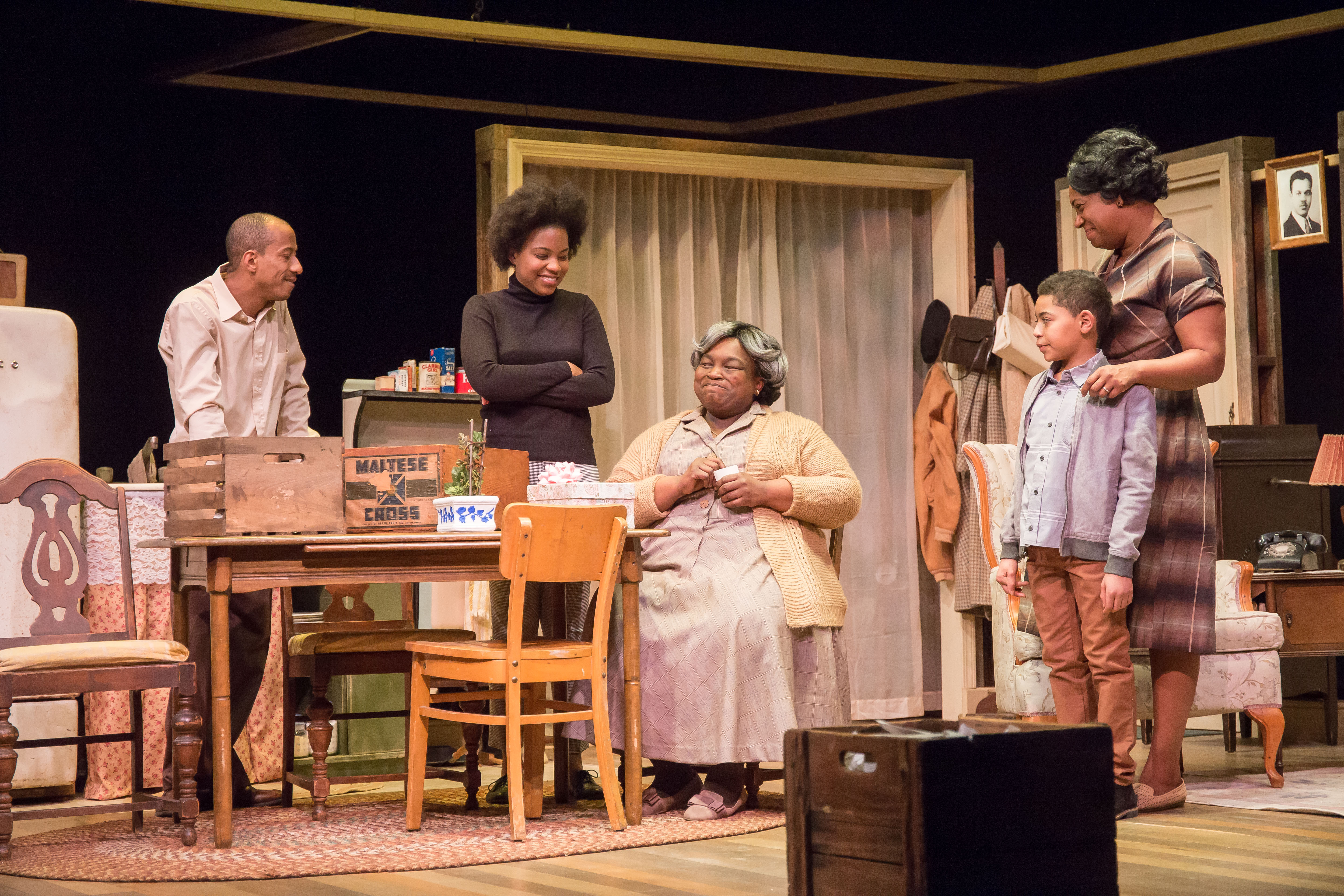Review by Doug Iden of Raisin in the Sun: Cincinnati Shakespeare Company

The American classic A Raisin in the Sun opens this weekend at the Shakespeare Theater in its second to last production in its current venue. Because of scheduling issues, I saw a preview prior to the official opening this weekend.
Raisin is the story of a black, ghetto family trying to survive in a dilapidated apartment in the south side of Chicago in the 1950“™s. Six people live in the claustrophobic apartment led by matriarch Lena Younger (Burgess Byrd) who is expecting an insurance check for $10,000 and is not sure how to spend it. Also staying there are Lena“™s two adult children, Walter (Geoffrey Barnes II) and student Beneatha (Renika Williams), Walter“™s wife Ruth (Torie Wiggins) and their son Travis (Shadow Avili). Tensions start to build when Walter presses his mother to use the insurance money to buy a liquor store which Lena opposes due to religious convictions and the strong suspicion that her son is being conned. Walter, employed as a chauffeur for a white family, is desperate to make a career of his own and is obsessed with making money. Walter“™s mercurial personality tears his family apart as he whipsaws between manic episodes of giddiness because of his dreams and a deep depression about his status in life. His long suffering wife Ruth stoically tolerates his mood swings but becomes desperate herself when she discovers she is pregnant with few good options for the future.
Lena“™s daughter Beneatha, hoping to become a doctor, is torn between two suitors, a rich fellow student who has assimilated into American white society and a native Nigerian who wants Beneatha to embrace her African heritage. She needs to decide both between two men and two cultures.
The interpersonal relationships collide when Lena decides to buy a house in an all-white community because that would be the cheapest house. A white man from Clybourne Park tries to buy them off which exacerbates the tensions. Walter still covets the money. In the center of this emotional whirlwind is Lena, who is trying her best to navigate the turmoil surrounding the money and still satisfy her increasingly fractured family.
This is a very powerful play with, like all great theater, a multiplicity of themes and undercurrents including assimilation, racism, family generational conflicts, clash of cultures, impact of poverty, education versus ignorance, alienation, greed and unreasonable expectations. The thirst for money and station can tear a family apart. But, despite the depiction of a black, ghetto family, the brilliance of this play is its universality. On the one hand, the play is a little dated, mired in the 1950“™s mores and language but, on the other hand, the story could be ripped from today“™s headlines.
The actors are a combination of resident Shakespeare Theater veterans and some newcomers and all are excellent. Burgess Byrd as Lena walks a tightrope between dictatorial leadership and a loving, caring feeling for her kin. Byrd“™s role as the centerpiece of the play is crucial and she performs admirably. An example is her tender care for a bedraggled plant which represents freedom and clean air in a garden of her own. Barnes inhabits Walter“™s volcanic personality, his naïve acceptance of his buddy“™s shady dealings and an infectious charisma while romancing his wife and provides the play“™s emotional upheavals. Newcomer Renika Williams is very believable in the coming of age subplot as she deals with the family conflicts while trying to sort out her own definition of a modern black woman. The direction of Christopher Edwards is spot on because the play never drags.
The set, designed by Shannon Moore, becomes another character in the play with its claustrophobic, cluttered dinginess. None of the furniture matches and appears to be purchased from a hand-me-down garage sale. The seedy condition of the major room which functions as the kitchen, dining room, living room and bedroom for young Travis sets the tone throughout the production. It is squalid but it is still home.
I grew up in the Chicago of the era and I remember vividly the racial tensions, all white neighborhoods trying to maintain their purity and the cultural clashes that existed. It was a difficult time but it enabled me to become a little less biased, I hope, than some of my contemporaries.
I laud the Shakespeare Theater for doing Raisin and strongly recommend the production. It is a difficult, nuanced but ultimately very rewarding evening in the theater which ends with Lena taking her plant to freedom. A Raisin in the Sun continues at the Shakespeare Theater through April 15.

